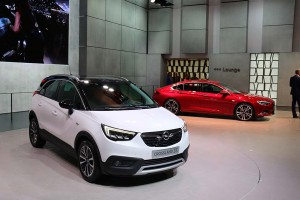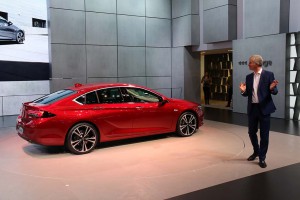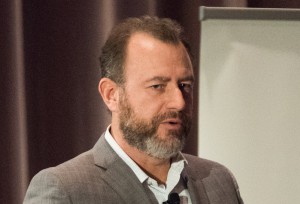When General Motors and PSA announced terms for the sale of the long-troubled Opel earlier this week, they said they expect to complete the deal later this year.
From a legal standpoint, barring some last-minute regulatory challenges, that’s likely to happen. But while the hand-off will be formalized, on paper, the long ties between GM and Opel will likely continue well into the coming decade.
A full separation “is going to be (over an) extended period of time,” GM President Dan Ammann told TheDetroitBureau.com during a conversation at the Geneva Motor Show.
(Live from Geneva! For complete coverage of the 2017 auto show, Click Here.)
Opel, which GM purchased in 1929, has operated in the red, running up billions of dollars in losses, since the last year of the old millennium. Recognizing that the Brexit vote – pulling Britain out of the European Union – was going to scuttle a hoped-for 2016 turnaround, and generate another loss in 2017, GM had enough and approached PSA, the French carmaker with which it set up a trio of joint ventures a few years back.
Pulling the deal together was relatively quick, the terms coming together in a matter of months, according to Ammann and others involved in the negotiations. PSA, parent of the Peugeot and Citroen brands, will pay $2.5 billion for Opel and its British sibling Vauxhall, as well as GM’s European financial services operations. GM, meanwhile, will retain Opel’s nearly $4.5 billion in underfunded pension liabilities.
(For more on the Opel sales details, Click Here.)
But the break will be far from clean, as became immediately apparent during the Opel news conference at the Geneva Motor Show. The German-based brand pulled the covers off two models that might be thought of as symbols of both its past and future.
The Insignia sedan is based on a platform developed by General Motors and shared with some of its products for North America, China and other markets. That includes the next-generation Buick Regal set to be unveiled at the New York International Auto Show barely a month from now.
The other model debuting in Geneva is the Crossland X, the first Opel product to emerge from the original GM-PSA alliance that is based on a Peugeot platform.
PSA CEO Carlos Tavares says he wants to switch all Opel products to his company’s platforms as soon as possible. But that will take time. The new version of the Insignia, for example, is expected to be around in Opel showrooms for at least six to seven years. True, PSA could opt to replace it with a model of its own design sooner, but that would cost hundreds of millions of dollars, said an Opel executive, asking not to be identified by name. From a business sense, that wouldn’t justify the dollars and cents.
Meanwhile, GM has a number of products that are based on existing Opel platforms, such as the Buick Cascada, that it eventually will need to replace. The Cascada, meanwhile, is imported from an Opel plant in Poland — which also builds the Opel Cascade — so GM could eventually transfer production to one of its plants in the U.S. or, perhaps, even in China.
Several other Opel designed and assembled products are reportedly in the works, the Buick brand particularly dependent upon its former German sibling.
Meanwhile, there are underlying components that GM, Opel and PSA for years to come. But that might go on indefinitely as part of the continuing alliance between the U.S. and French maker. In fact, GM and PSA may wind up using the Opel deal to actually strengthen their already existing ties. The Detroit company has the option to buy a significant stake in its Parisian ally.
Alliances have become a big thing in the auto industry. Daimler has signed on as a junior partner in the successful Renault-Nissan alliance, for example, and the three manufacturers now share a variety of parts, engines and even whole vehicle platforms.
That, several observers believe, very well could become the case with GM and Peugeot, Opel serving as the bridge bringing them closer together.
(GM laying off 1,100 workers at Michigan plant. Click Here for the full story.)



